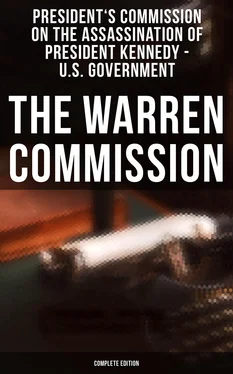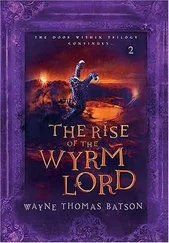And Lee was standing there before me on the other side of the glass.
Mr. Dulles. Did you have the impression that the officers had told your brother that you were the one who was coming to see him?
Mr. Oswald. No, sir; I did not.
Mr. Dulles. Because you just said that the officer said he was ready to see you, and I gained the impression from that——
Mr. Oswald. Yes, sir—whether or not I meant by that that—I do not believe that was my full meaning on that statement, because I was not aware that they had actually told Lee that it was me he was about to see.
Mr. Jenner. Did you converse with your brother?
Mr. Oswald. Yes, sir; I did.
Mr. Jenner. By what means?
Mr. Oswald. By telephone, while looking at him through the glass partition.
Mr. Dulles. How far apart were you, roughly?
Mr. Oswald. Just a matter of inches.
Mr. Jenner. How long were you in that room, conversing with your brother?
Mr. Oswald. Approximately 10 minutes.
Mr. Jenner. And as near as you can recall, what did he say to you and what did you say to him?
Mr. Oswald. I do recall to the best of my ability his first statement to me was "How are you?"
My reply was "I am fine."
I asked him how he was—as I observed the cuts and bruises on his face. He said he was just fine, and that they were treating him okay. I believe his next statement was at this time "I cannot or would not say anything because the line is apparently tapped."
I did not comment on that, and he rather carried the conversation for 2 or 3 minutes.
Mr. Jenner. Would you repeat it to us as best you can recall it, please?
Mr. Oswald. Sir, I do not recall this particular part of the conversation.
Mr. Jenner. Just do your best.
Mr. Oswald. I am sorry, sir, I just cannot recall that particular part of the conversation. I might comment on that particular part to this extent. That I felt that it was rather a mechanical conversation from his standpoint. He seemed to be speaking very fast, and there was approximately 2 or 3 minutes of him speaking in this nature. Then I took the initiative and started speaking to him about the family.
Mr. Jenner. His family?
Mr. Oswald. About the family, including his family, my family. And, also, at this time, when we talked about his family in particular—I believe my question to him was "What about Marina and the children?"
His reply to me at that time was "Don't worry about them. The Paines will take care of them"—that his friends, the Paines, would take care of them satisfactorily.
Mr. Jenner. That Lee's friends, the Paines, would take care of them satisfactorily?
Mr. Oswald. That is correct.
My reply to him on that was what he considered to be his friends were not mine.
Mr. Jenner. Did he respond to that?
Mr. Oswald. Not to my recollection, sir.
Mr. Dulles. Were you the first member of the family to see him, or had Marina seen him the day before?
Mr. McKenzie. Both Marina and Marguerite had seen him before.
Mr. Oswald. Earlier that afternoon, sir. I was the last member of the family to see him.
Mr. Jenner. Did you say anything about the new child, Rachel?
Mr. Oswald. Yes, sir; I did.
Mr. Jenner. Did you raise that, or did he?
Mr. Oswald. I believe I did, sir.
Mr. Jenner. What did you say?
Mr. Oswald. I simply stated that I had seen the new baby and was not aware of it at that time.
Mr. Jenner. Not aware that the baby had been born?
Mr. Oswald. That is correct.
Mr. Jenner. Did he respond to that?
Mr. Oswald. Yes, sir, he did.
Mr. Jenner. What did he say?
Mr. Oswald. He smiled and stated he had hoped for a boy rather than a girl. His further comment was, "Well, you know how that goes."
Mr. Jenner. He said nothing, I take it, then, by way of apology or otherwise that you had not theretofore been informed of the birth of this child?
Mr. Oswald. That is correct.
Mr. Jenner. You record on page 13 of your memorandum—you use this expression: "I was not talking to the Lee I knew."
Do you find that?
Mr. Oswald. Yes, sir; I do.
Mr. Jenner. Would you read that full sentence?
Mr. Oswald. "He talked about the Paines as his friends and that they would take care of Marina and the children."
Excuse me—I started too soon.
Mr. Jenner. That is all right.
Mr. Oswald. "I stated who he considered to be his friends were not necessarily mine. I did this to try to get through to him. To me his answers were mechanical and I was not talking to the Lee I knew."
Mr. Jenner. Were you able to get through to him? Did you feel you got through to him?
Mr. Oswald. No, sir; I was not.
Mr. Jenner. And would you elaborate, please, on your expression "I was not talking to the Lee I knew"?
Mr. Oswald. I was referring more specifically to the first part of our conversation, where his conversation seemed to me, as previously stated, very mechanical.
Mr. Jenner. You had the feeling he was not exposing himself fully to you?
Mr. Oswald. That is correct.
Mr. Jenner. Was this the last time you ever saw your brother?
Mr. Oswald. Alive, sir?
Mr. Jenner. Yes.
Mr. Oswald. Yes, sir; it was.
Mr. Jenner. On page 14 you record a later conversation after you had left your brother—you have an expression there along the lines that you agreed with someone that if the conversation had been person to person, that things might have been different. Do you find that?
Mr. Oswald. Yes, sir; I do.
Mr. Jenner. Would you please elaborate on what you meant by that?
Mr. Oswald. By "we" in that paragraph, sir, on page 14, I am talking about Mr. Tom Kelley, Inspector from Washington, D.C., United States Secret Service, and agent, Mr. Mike Howard.
Our discussion was of the nature—I related to them as best I could remember my entire conversation with Lee Harvey Oswald on that afternoon of November 23, 1963, and I was of the opinion, or perhaps expressed, either by Mr. Kelley or Mr. Mike Howard, that had we been placed in a room facing each other, perhaps more could have been learned or something could have been learned about whether or not he was actually guilty or how much he was involved in the assassination of the President of the United States.
Mr. Jenner. Could I elaborate on that? If you talked person to person to him in a room, in which there was assurance there was no bugging, nobody listening to your conversation, that you might have been able to obtain more information from him?
Mr. Oswald. That is correct.
Mr. Jenner. Is that a fair summary?
Mr. Oswald. That is, sir.
Mr. Jenner. If you wish him to elaborate or expand or amend that, Mr. McKenzie, it is perfectly all right with me.
Mr. McKenzie. No—that is all right.
Mr. Jenner. Does Mr. Oswald wish to elaborate?
Mr. Oswald. No, sir; I do not.
Mr. Jenner. Mr. Chairman, I have concluded my examination.
On behalf of myself and the staff, I express to Mr. Oswald and to Mr. McKenzie our appreciation for the splendid cooperation that we have received, and the frank and direct answers that the witness has given to all of the questions I have put to him.
Mr. McKenzie. Thank you, sir.
Mr. Dulles. I am very glad that was put on the record. I entirely share it for the Commission.
Mr. Oswald. If I could, possibly, sir, at this time——
Mr. Jenner. Would you like to add anything?
Mr. Oswald. I would like to make one little statement in regard to my memorandum, on page 12.
Mr. Jenner. Proceed.
Mr. Oswald. In relation or reference to my intentions at that time, as it is now, as recorded on page 12, "Intentions then as now was to find out the truth and nothing else."
Thank you.
Mr. Dulles. Thank you.
Читать дальше












